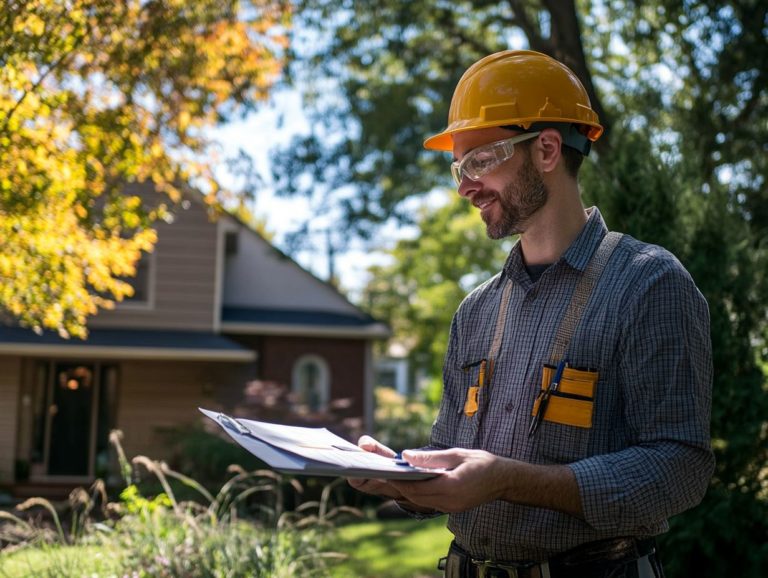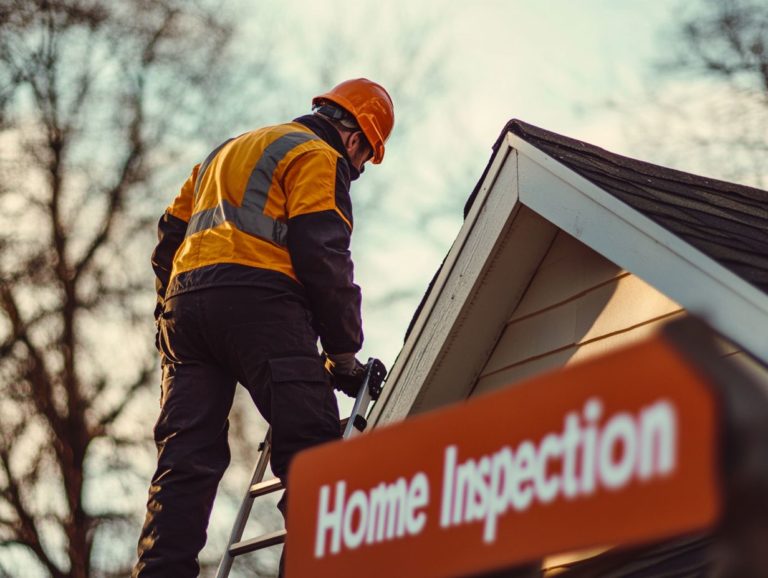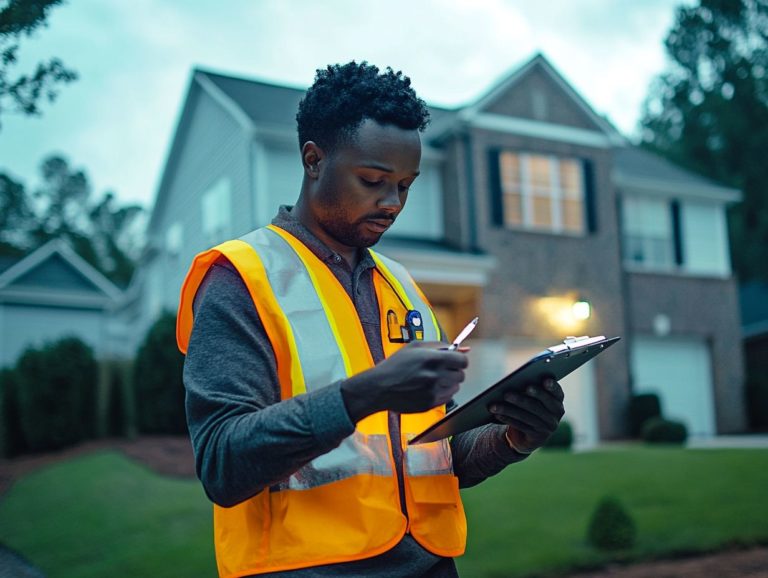The Impact of Home Inspections on Closing Deals
When you navigate the world of real estate, home inspections are vital for smooth transactions.
This article explores the importance of home inspections. You ll learn what to expect, common issues, and the role of the inspector.
We ll also show how inspection findings can shape negotiations and impact closing deals.
Whether you re a buyer or a seller, understanding these elements helps you make informed decisions.
Read on to discover how home inspections can significantly influence your real estate journey.
Contents
Key Takeaways:
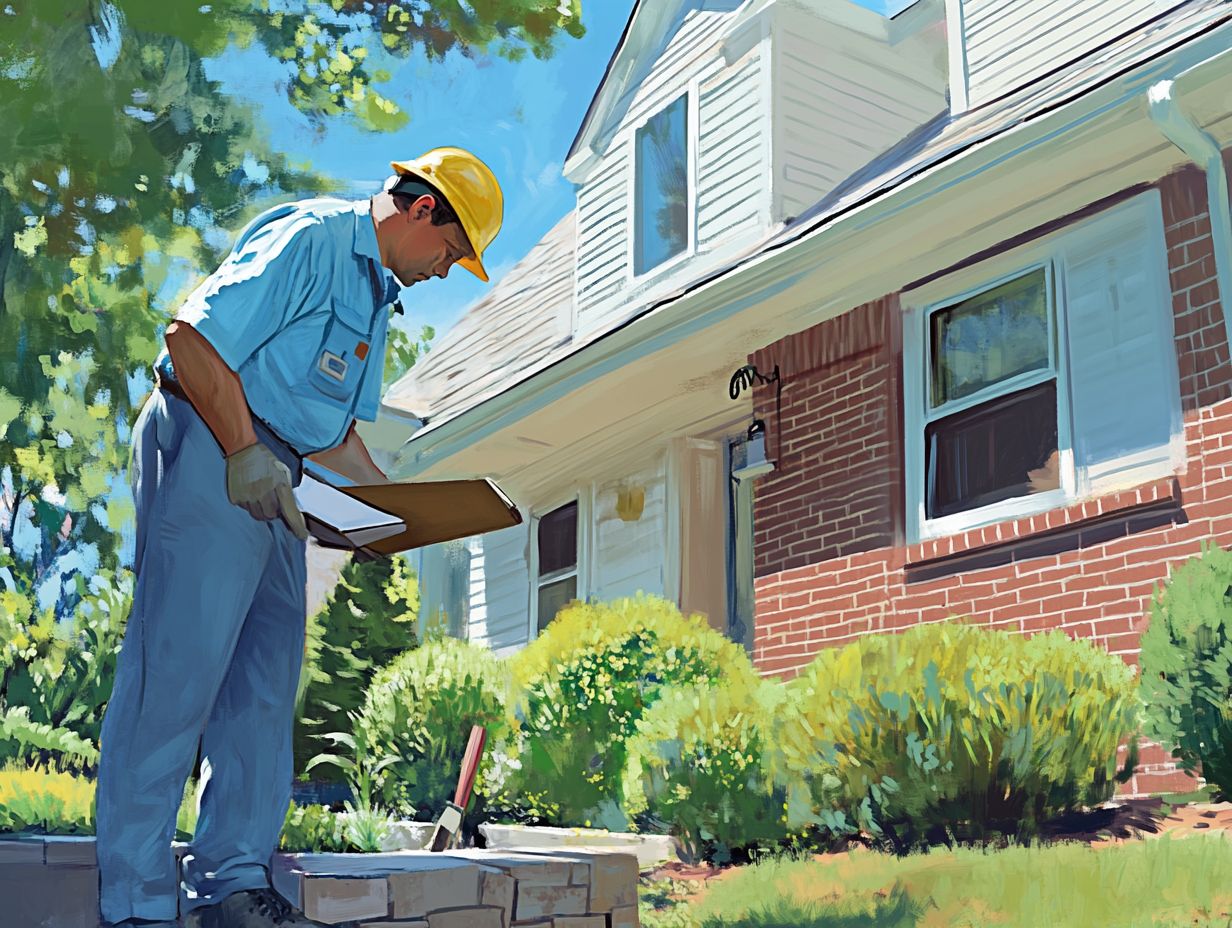
Home inspections are a crucial part of the real estate process, giving buyers valuable insights into a property’s condition.
The inspection process involves a careful check-up of the property’s structure, systems, and major components. It can reveal common issues like electrical, plumbing, and structural problems.
An expert home inspector plays a key role in spotting potential issues, and their findings can significantly affect the impact of home inspections on home value and the closing of a deal.
The Importance of Home Inspections
Home inspections are essential in real estate transactions, as they highlight the role of home inspections in real estate transactions and provide a clear understanding of a property’s condition before closing.
This transparency builds trust and reduces disputes by identifying any issues. It offers peace of mind for both buyers and sellers.
For buyers, this helps in making informed decisions. Sellers can address major repairs before negotiations.
Understanding the Role of Home Inspections in Real Estate Transactions
Home inspections protect both buyers and sellers through a detailed assessment of a property’s state.
As a buyer, these evaluations are invaluable. They reveal hidden issues, allowing you to negotiate effectively.
If you re selling, a home inspection helps you address concerns upfront, preventing red flags that could deter buyers.
Coupling the inspection with a home warranty enhances peace of mind. Warranties can cover repairs, easing future worries.
This proactive approach fosters trust and paves the way for smoother transactions.
The Home Inspection Process
The home inspection process involves a careful check-up of a property by an expert inspector. They assess several critical elements, including:
- Structural integrity
- Electrical systems
- Plumbing
- Maintenance concerns
This thorough evaluation ends with a detailed report, enabling you to make informed decisions about your investment.
What to Expect During a Home Inspection
During a home inspection, expect a careful check-up of the property by an expert. The inspector will review various systems and potential maintenance issues.
This assessment covers key areas like the roof, plumbing, electrical systems, HVAC units (heating, ventilation, and air conditioning), and even the foundation.
The inspector identifies problems, hazards, and items needing immediate attention or future upkeep.
After the inspection, you ll receive a detailed report with findings, pictures, and repair recommendations. This document empowers you to negotiate confidently and avoid surprises later.
Common Issues Found During Home Inspections
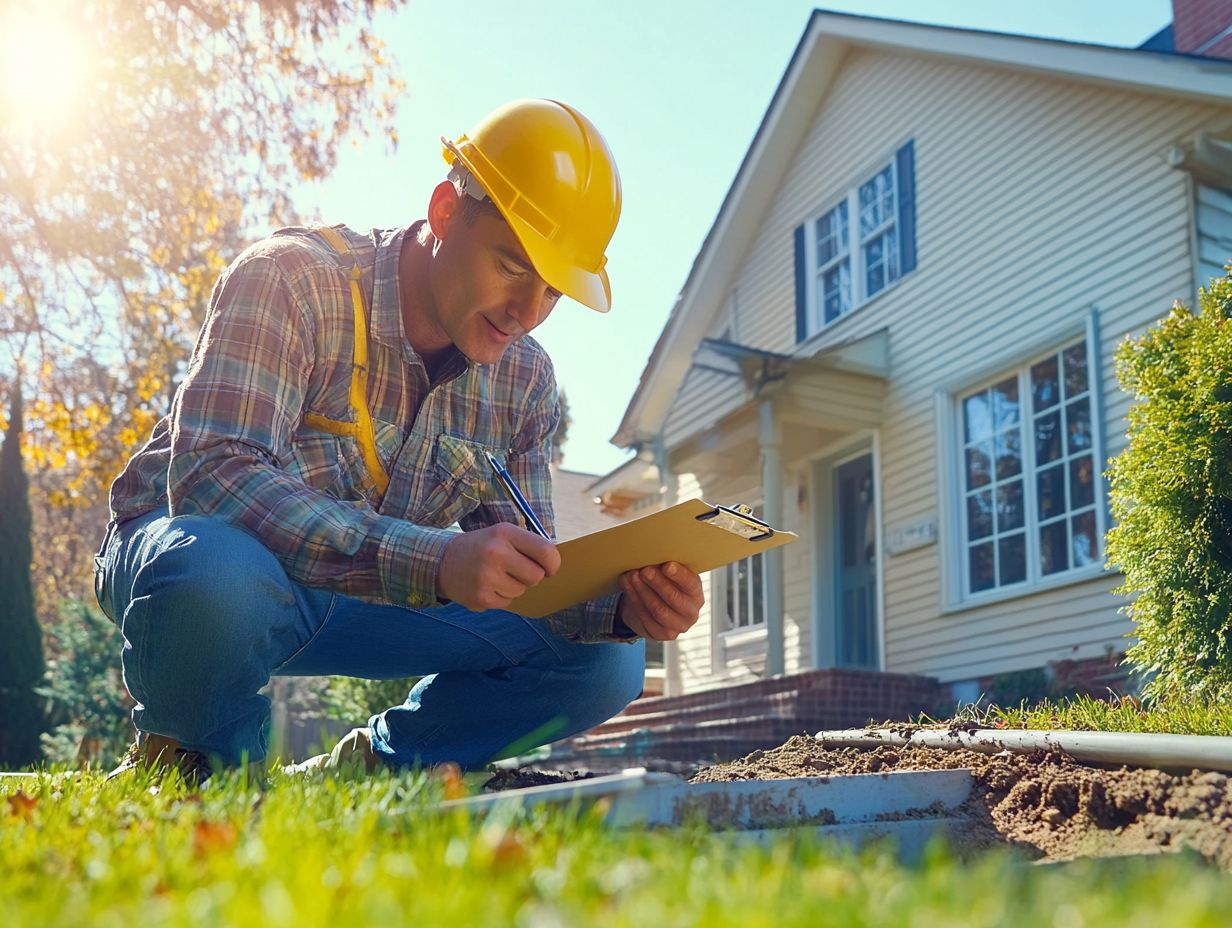
During home inspections, you may commonly encounter problems in the building’s structure, outdated electrical systems, plumbing leaks, and signs of pest infestations.
If these matters are not addressed promptly, they can escalate into significant repairs. This can impact the overall integrity and value of your home.
Identifying and Addressing Common Problems
Identifying and addressing common issues during a home inspection is essential for both buyers and sellers. Understanding the importance of home inspections before closing ensures a seamless transaction and helps avoid unexpected closing costs.
As a prospective buyer, leveraging insights from the inspection report can be a powerful strategy. It allows you to negotiate necessary repairs or price adjustments before finalizing the sale.
This proactive approach mitigates potential risks and enhances the overall transparency of the deal.
If you re a seller, taking the initiative to fix identified issues can significantly benefit you. Fixing these issues boosts your property’s value and draws in eager buyers!
By recognizing the importance of awareness and preparation in real estate transactions, both parties can streamline the process. This ensures they enter closing with confidence and peace of mind.
The Role of the Home Inspector
As a home inspector, your role is to conduct a thorough evaluation of a property’s condition. You leverage your expertise to identify potential issues and offer insightful recommendations.
You produce a detailed inspection report that serves both buyers and sellers, guiding them through the intricacies of the property.
Qualifications and Responsibilities of a Home Inspector
A qualified home inspector brings a wealth of specific certifications and relevant experience to the table. This ensures they can conduct thorough inspections and provide accurate assessments of property conditions.
This expertise isn t just about having a sharp eye for detail; it involves completing rigorous training programs and obtaining essential certifications from reputable organizations. These professionals are well-versed in local building codes, safety regulations, and potential structural issues.
Their key responsibilities include:
- Preparing for inspections by reviewing pertinent documentation.
- Conducting comprehensive evaluations during the inspection.
- Delivering detailed reports afterward.
By hiring such qualified individuals, you gain invaluable insights into a property s condition. This enables you to make informed decisions that protect your investment and provide peace of mind.
The Impact of Home Inspections on Closing Deals
Home inspections play a pivotal role in closing deals in real estate. They provide you with crucial insights into potential issues that might require negotiations over repairs and closing costs, highlighting the impact of home inspections on property value.
This helps you make informed decisions before you buy.
How Home Inspections Can Affect the Closing of a Real Estate Deal
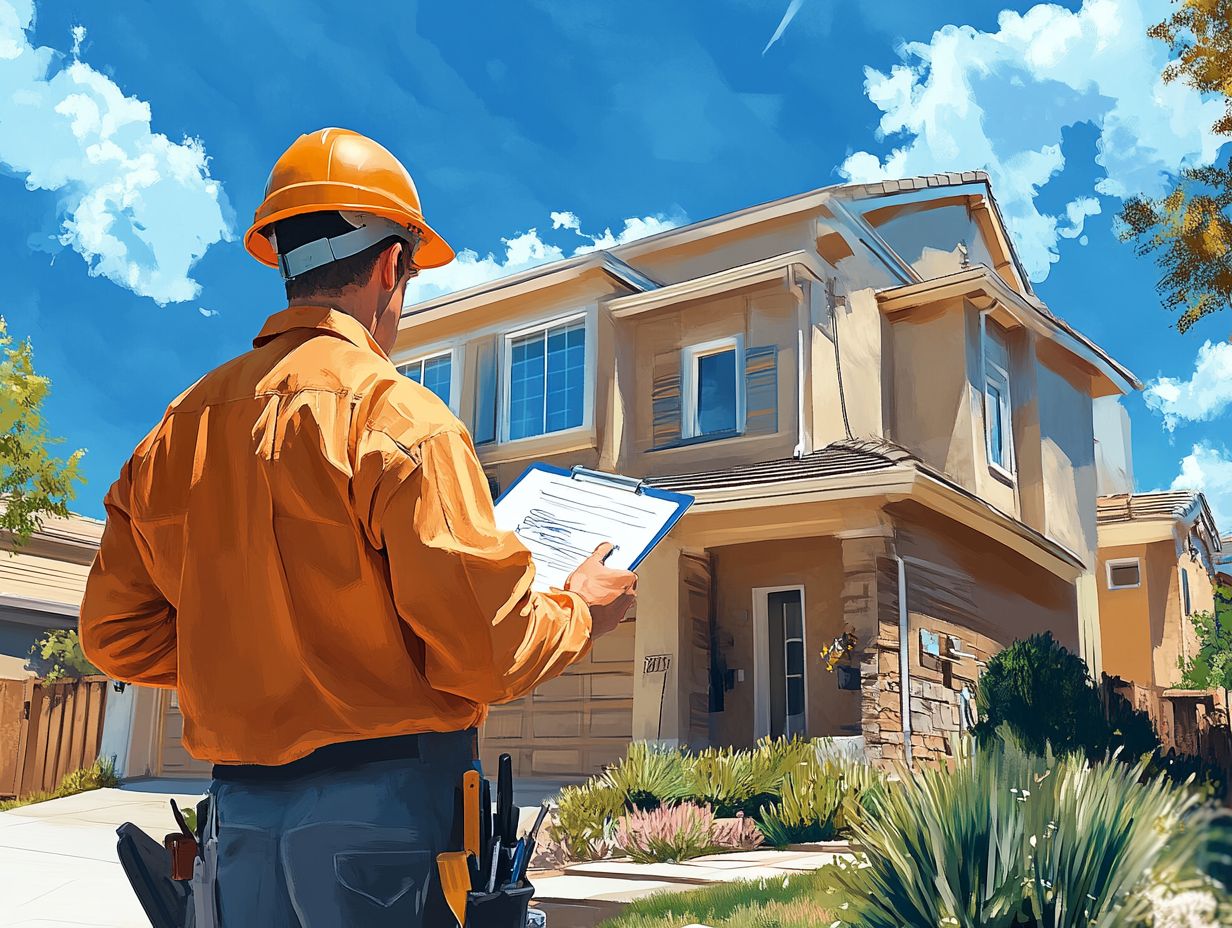
The results of a home inspection can significantly impact the closing process of your real estate deal. Understanding the importance of home inspections in real estate deals can help you navigate any issues uncovered, prompting you to request repairs or even reconsider your purchase.
For example, in a recent situation involving a charming historic home, the inspection revealed substantial plumbing problems. This raised concerns for you as the buyer and initiated a protracted negotiation process.
The sellers were hesitant to reduce their price initially. However, after back-and-forth discussions and considering the potential costs of the repairs, they ultimately agreed to make the necessary fixes before closing.
These scenarios influence both parties involved. You might secure a more advantageous deal or improved property conditions, while the sellers may need to rethink their sales strategies or prepare to make concessions to keep the deal on track.
Negotiating Repairs and Renegotiating Price
Negotiating repairs and revisiting the price after a home inspection is standard practice in real estate transactions. This allows you, as a buyer, to address any issues that may have come to light.
Sellers can retain their competitive edge in the market by making necessary adjustments.
Using Home Inspection Findings to Negotiate Repairs or Adjust the Sale Price
You can leverage home inspection findings to negotiate repairs or adjust the sale price. Documented issues help secure fair compensation and address significant repairs before finalizing the deal. Understanding the role of home inspections in buyer-seller negotiations is essential, and effective communication is key in this process.
Start by thoroughly reviewing the inspection report. Pinpoint critical repairs that may impact safety or the property s value. Present your findings calmly and factually to keep discussions constructive.
Sellers should acknowledge legitimate concerns and consider proposing solutions. Options may include offering a repair credit or completing certain repairs before closing.
By approaching negotiations with an open mindset, both parties can find common ground and arrive at a resolution that satisfies everyone.
Frequently Asked Questions
What is the purpose of a home inspection?
The purpose of a home inspection is to assess a property’s condition. It identifies potential issues or defects affecting the home s value or safety, ensuring transparency for both buyers and sellers.
How does a home inspection impact the closing deal?

A home inspection can significantly impact the closing deal by revealing issues that may require repairs or renegotiation of the purchase price. Buyers can use inspection results to negotiate repairs or credits, while sellers can address issues before listing. Understanding the impact of home inspections on negotiations is crucial for both parties involved.
Who pays for the home inspection?
Typically, the buyer pays for the home inspection during the due diligence period. This expense ensures the property is worth the investment. However, some sellers may opt for a pre-listing inspection to attract more buyers.
What happens if the home inspection reveals major issues?
If a home inspection reveals major issues, it can impact the closing deal. Depending on the contract terms, the buyer may back out, negotiate for repairs, or proceed with the purchase as-is. Understanding the role of home inspections in home sales is crucial, as sellers might address these issues or make concessions to keep the deal on track.
Is a home inspection required for closing a deal?
In most cases, a home inspection isn’t required for closing, but it is highly recommended for transparency and to avoid legal issues later. Understanding the key role of home inspections in real estate can also help some lenders determine whether to approve a mortgage loan.
How can I prepare for a home inspection?
As a buyer, prepare by doing a walkthrough of the property and listing any concerns. Request maintenance records from the seller. As a seller, ensure the property is clean and accessible for the inspector, addressing known issues beforehand.
If you have more questions or need assistance, feel free to reach out to schedule your home inspection today!


